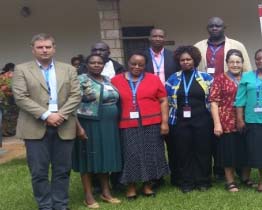About 100 men and women gathered in Nairobi, Kenya, June 6-8 for a regional conference on religious and migration in the 21st century, having the specific focus of “Women and Migration in the African Context”. Organized by six New York based religious NGOs at the UN (Congregations of St. Joseph, Augustinians International, Franciscans International, Passionists International, Sisters of Notre Dame de Namur and VIVAT International), it gathered a rich mix of about 100 participants, including several experts, representatives of both international and government agencies, and those from religious groups working at the grassroots, as well as refugees and migrants themselves. Among groups represented there were: the International Organization for Migration (IOM), the United Nations High Commissioner for Refugees (UNHCR), the Department of Immigration Service of Kenya, the Kenyan Conference of Catholic Bishops, Jesuit Refugee Services (JRS), and the Pan African Network in Defense of Migrants’ Rights (PANiDMR)
The conference occasioned insightful discussions on migration and refugees in Africa, addressing the issues of migration, trafficking in persons and refugee dynamics specifically from an African and women’s perspective. A major focus was how best to harness the benefits of migration while minimizing its negative effects. The deeper understanding of migration and refugees dynamics gained, suggest a needed change in the perception of migration, particularly in Africa. Through the interactive participation, that offered the views of the various individuals, organizations and agencies that attended, the conference, threw light on both effective practices and gaps in the systems responding to migration, trafficking in person and refugees.
The discussions brought out how different groups are already responding in different ways to issues and concerns of migrants, refugees, diasporas, trafficked victims and internally displaced persons. It also pointed out various activities and efforts by national governments, UN agencies and international organizations towards a constructive national and regional management of migration aa well as direct services to migrants, refugees and victims of human trafficking. A good number of civil society organizations also play strategic and supportive roles in these efforts in the region, yet muc still needs to be done to address migration and refugee issues on the continent.
The Conference served to stimulate greater collaboration among women and men religious, civil society organizations, agencies and the government. It achieved its purpose by raising the level of understanding and response of African religious to migration and refugee issues and updating the participants on current migration issues on all fronts, especially from the perspective of African women. It identified some ways to improve grassroots responses, including stimulating local advocacy through a network for collaboration of efforts. It provided insight and perspectives that could enhance civil society advocacy mechanisms in the various processes involved with global migration.
At the end of two and half days of intense listening to new insights and shared experiences, all were more aware that we are living at a time of turbulence, tension and transition. In this hour of choice, two paths are ahead of us: fear and self/national interest, or hope and shared responsibility. As Peter Sutherland, Secretary General Representative at the Global Forum on Migration, once said, “We cannot afford to be to be indifferent and simply bystanders to this crisis”. The role of civil society, and in particular faith-based organizations, is critically and urgently needed at this time on all fronts. They are key in two ways. By raising their voices in advocacy, they build up political will to respond to the issue. And they also provide direct help to the victims and work to defuse tension between ordinary citizens and their migrant guests.
This Conference served to stimulate greater collaboration among women and men religious, CSOs, agencies and the government. With more sustained interactions, all the actors will be better able effectively to tackle the administrative and policy gaps faced by migrants on daily and routine basis. Human rights should not stop at any borders.

